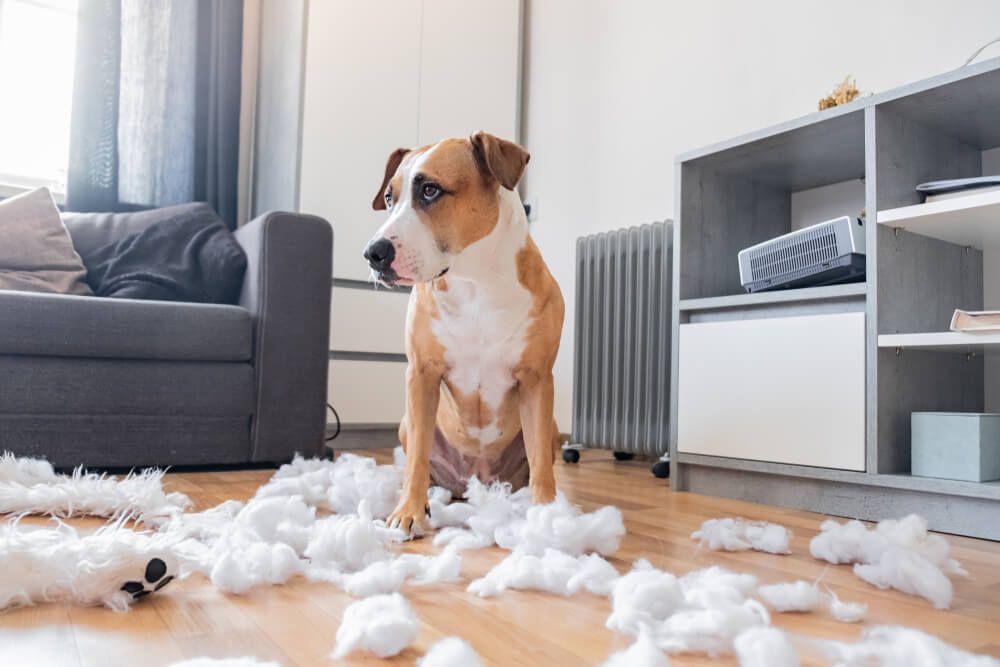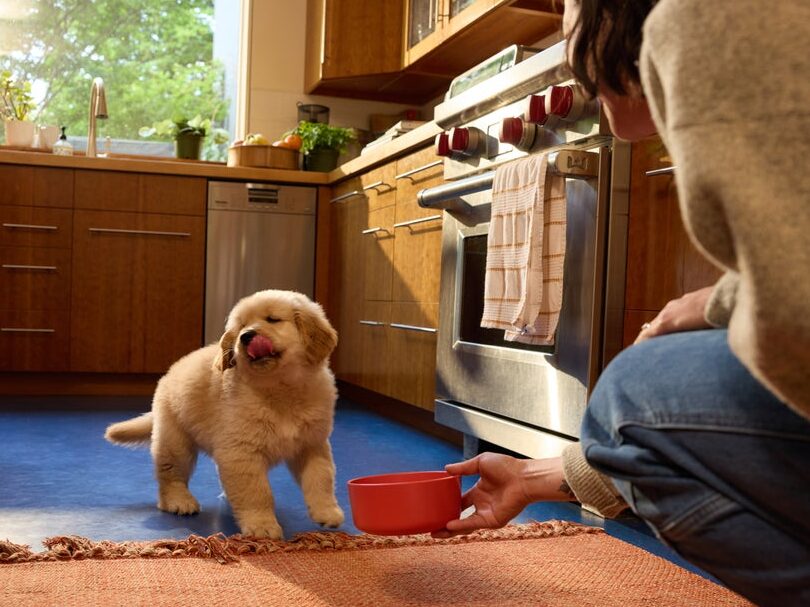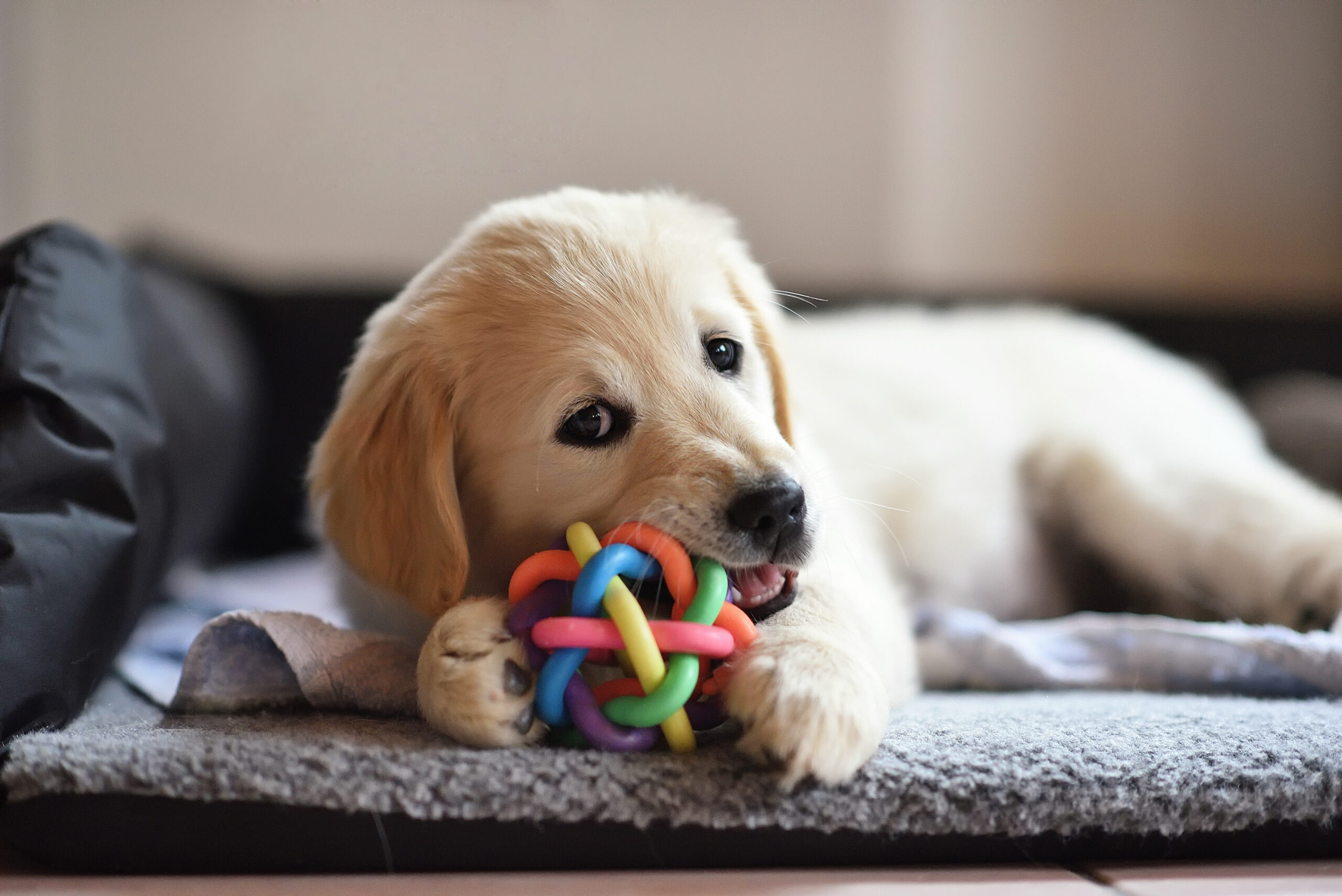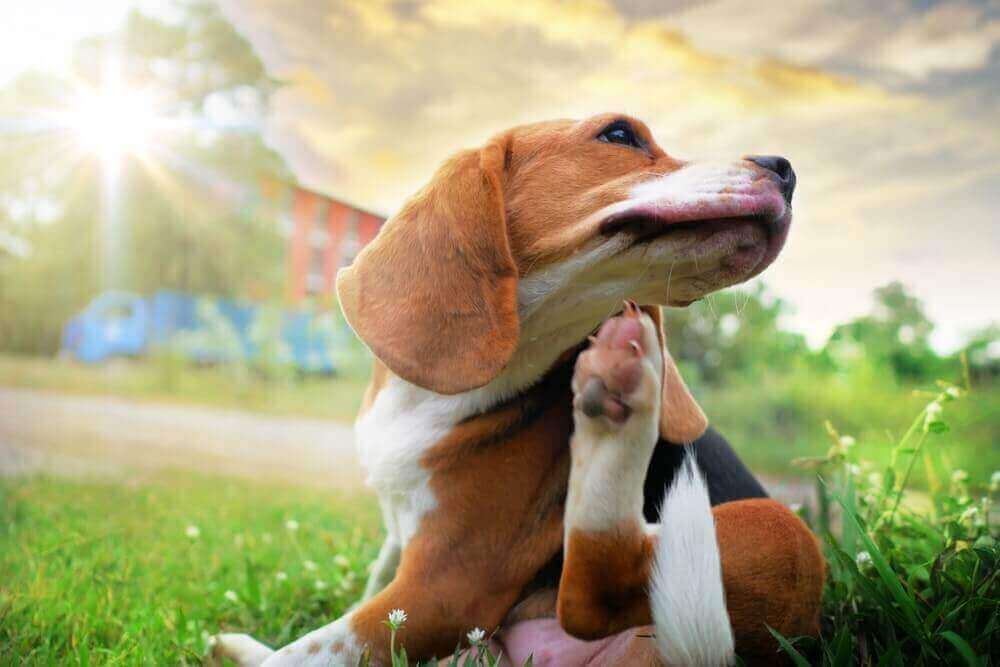Hey Ollie blog readers! We’re offering you an exclusive 60% OFF your starter box! Try now!
In the middle of March, the world began to shut down to slow the spread of COVID-19. People moved their offices home, restaurants, and non-life-sustaining businesses shut down. Our dogs rejoiced! The humans were home for unlimited belly rubs, takeout and toilet paper obstacle courses.
In addition to having more time at home with the humans, the dog parks were padlocked, doggie daycares were forced to shut their doors and group training was moved to Facebook Live and Zoom!
Some dogs thrived with their humans at home, while others were frustrated by missing playtime with friends or visiting the office or therapy dog visits.
Trainer Jessica Lempert, CPDT-KA with Philly Unleashed says she has been receiving many calls over the past few weeks, about dogs who are behaving badly. She says this is due to the fact that we’ve now been home and/or had our lives dramatically changed for the past 3 months or so.
These behavior issues stem from not having an outlet for all of the young dog energy. Due to the risk of spreading Coronavrus between humans, playgroups, dog parks and other opportunities for dogs to socialize have been mostly eliminated.
Additionally, some dogs are frustrated that although their humans are home, they can’t have their undivided attention. The humans are busy figuring out work or trying to keep businesses going, applying for unemployment or other disaster-related funding, and coordinating supplies. This seriously cuts into time for tugging, tossing, fetching and belly rubs!
For many dogs who spend some time in a crate or napping while they have the house to themselves, they are finding that naptime is either eliminated or being interrupted since the house isn’t as quiet as it was.
In many houses, the doorbell may be ringing more frequently as drivers drop off Amazon deliveries, groceries, supplies, and takeout. For dogs who are reactive to the doorbell, this can create new challenges or, opportunities to work through the reactivity.
How can owners help their puppies through this time?
If you have a young puppy, Philly Unleashed has created a drop off puppy boot camp program on their farm. This is to provide your puppy an opportunity to work with a trainer and play with other age-appropriate puppies in the safest way possible during this time. If you live outside the southeastern Pennsylvania or southern New Jersey area, contact trainers near you to see if they are offering a similar program until puppy kindergartens are running again.
Another option is free classes on both Philly Unleashed and PetPlan’s Facebook pages. These classes focus on everything from the basics for new puppies to fun tricks like picking a pocket and bowling. They also offer options for agility activities you can do with your pup in your home. These are great for older dogs who need some mental and physical stimulation.
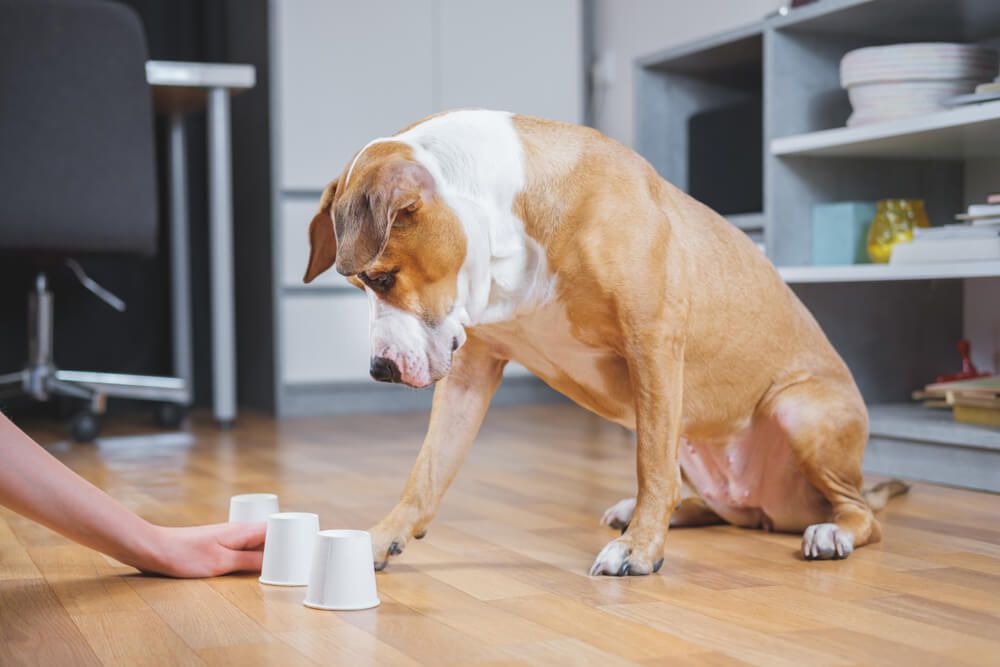
Training During Quarantine
Even though some states are starting to lift stay at home orders, life may not return to “normal” for some time. Jessica recommends using this time to work on the basics with your puppy or even your older dog. Working cues like leave it or drop it will be helpful on walks if your puppy finds trash or even discarded PPE on the ground.
Other cues to practice during this time include outdoor stays (upping that distance, duration, and distractions), recall from a distance or distraction and teaching or reminding your puppy that they need to ask permission before saying hello to another person or dog on the street.
As people may have varying comfort levels with interacting with you and your dog (even when social distancing can be maintained) you want to teach your dog to wait for permission (from you) before moving towards someone’s space. It is still believed that the risk of dogs transmitting COVID-19 to humans is very low, some people still do not want to interact with other dogs.
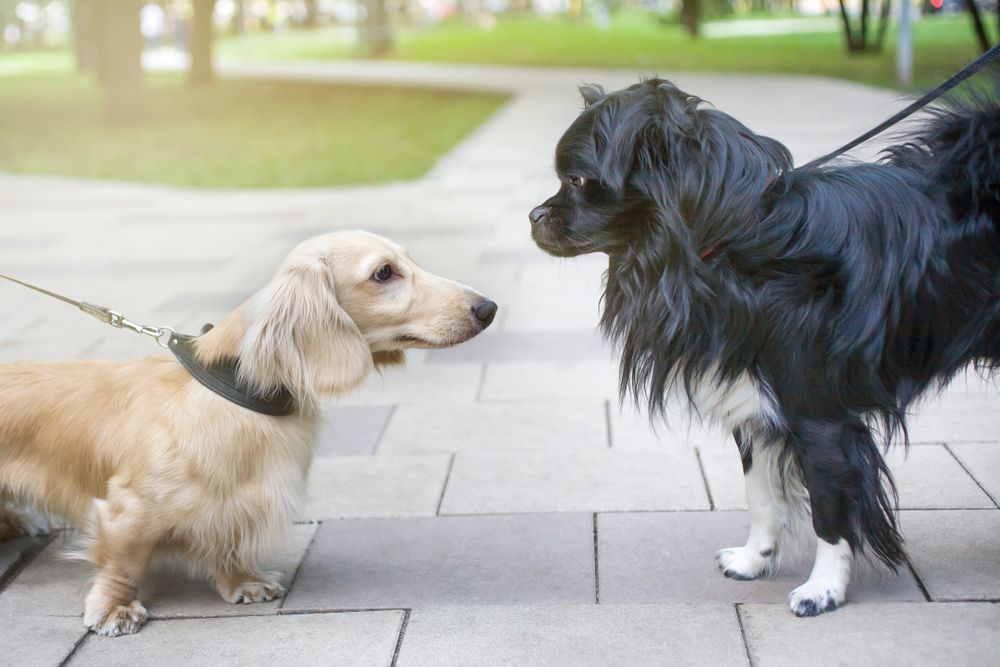
Socialization
While socializing now is more difficult it is not impossible. Does your dog have a friend or a neighbor that they play nicely with? If you or a neighbor has a fenced-in yard, it may be okay to arrange a playdate with the humans supervising from at least 6 feet apart. Before you let the dogs play make sure you are communicating with the other owner or owners. Have you both been practicing social distancing? Do you have any COVD-19 Symptoms? Will you wash your hands and wear masks as needed? If the dogs need to be separated who will step in? Communicating and having a plan will keep everyone safe!
Jessica reminds clients this is not the time to try to find new friends for your pup, as this will likely mean making new human friends as well!
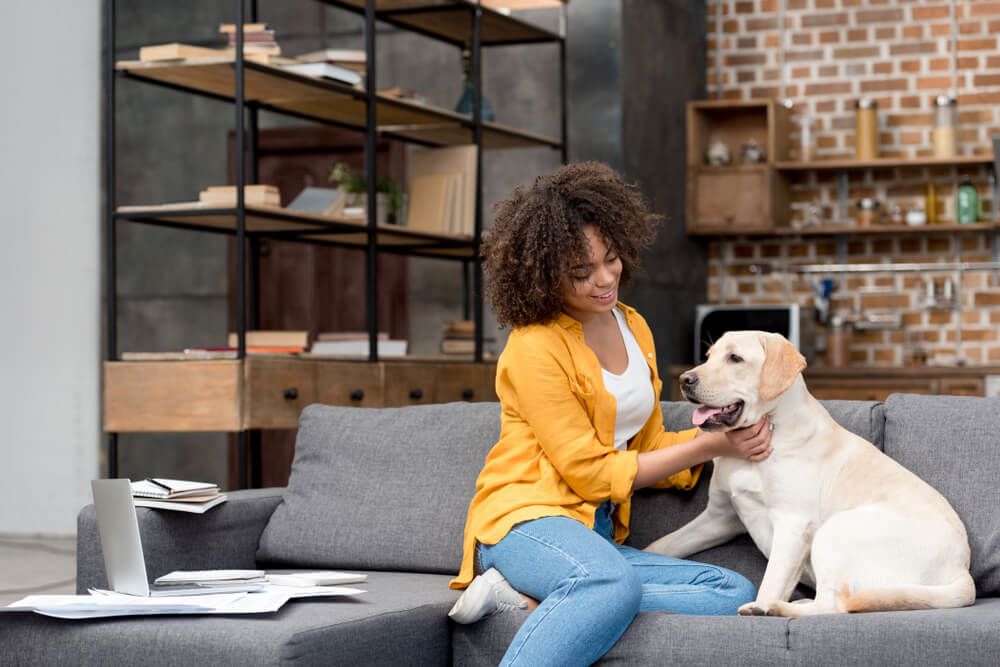
Returning to a new normal
As restrictions relax you (and your dog) may have more opportunities to get out of the house. Your dog may see people wearing masks, gloves, or other forms of PPE. To prepare your dog for this, you can show them these items and try them on in your house. Give lots of praise and treats so that your pup associates these items with good things.
If you know you are going to be returning to work or otherwise changing your schedule, start practicing with your dog as soon as you can. If your dog hasn’t been spending much time in his crate, start working on crate training again. You can start by putting some treats in the crate and having your dog go in with the door open. Once this feels comfortable, start shutting the crate door and leaving the room. Work up to leaving your pup alone in the crate for longer durations, as you did with your pup’s initial crate training.
If your pup hasn’t been in the car for a while, start working on getting in the car and going for a short ride. Similar to re-training the crate, re-train the car in short sessions working up to a full car ride.
If your pup used to come to work with you and now can’t due to social distancing regulations, this might be a big change for them. In this case, you might want to work with a trainer to develop a plan. You may need to crate train or hire a dog walker to come and take your pup out in the middle of the day while you aren’t home.
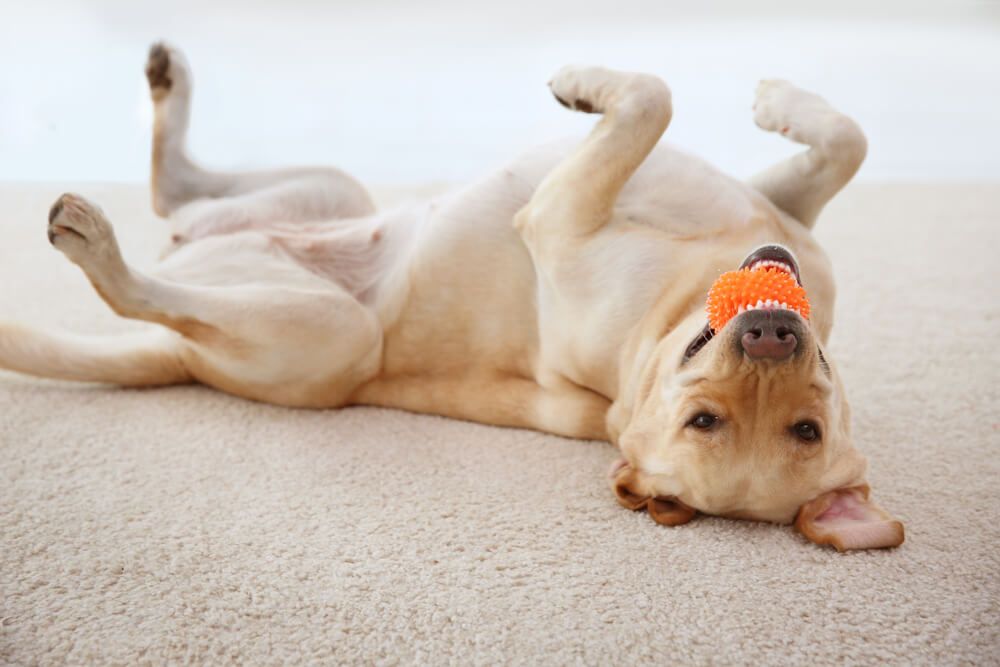
Beating Boredom
While a lot of these issues come from the lack of socialization and interruption of your pup’s routine, one thing that can help is spending some structured time with your pup. Remember to keep training sessions positive and within your pup’s attention span. Three short sessions in a day is likely better than one long session. Try to schedule these into your day to give you a break from your computer screen.
While you should work the basics here are a few other fun things you can do to keep your pup engaged and having fun with you:
1. Bowling
While you can purchase some cute bowling pins online, a few empty plastic bottles or cans from your recycling bin will work just fine for this game. Grab 3-5 things from your recycling bin and one of the full cans you probably bought at the beginning of the pandemic to use as a ball. You will need to teach your pup to push the “ball” (can) into the empties and knock them down. To do this, place a treat under the can you want them to push. Your pup will probably push the can out of the way to get the treat. Allow them to have the tasty treat and offer praise. Keep working this until your pup gets the idea of the game. You might need to use treats for a while!
2. Roll out the red carpet
For this game, you don’t actually need to have a red carpet at all! A yoga mat will work just fine. You want your pup to use their nose to unroll the mat. At the end, you can have them finish by sitting on the mat. If your dog knows “sit pretty” that trick would also work well at the end of the unroll as well. To help your dog figure this one out, grab some small treats, and roll them into the yoga mat or carpet. Your pup will use their nose to push the mat and eat the treats as they go. As your pup gets better at this, you can use fewer and fewer treats in the mat.
3. In-home (or yard) obstacle course
If your puppy or dog is old enough for some jumping you can use a broom handle or hula hoop to make some jumps. You can also have your pup go under the broom handle. Use a few chairs and a blanket to make a tunnel and some cones or even toilet paper rolls to make some weave poles. Be creative (but safe) and have fun with your pup interacting with these objects in new and fun ways.
These tips and tricks should help you and your pup get back on track. If they don’t or you need more specific advice, reach out to your pup’s trainer, they will love to hear from you. If your pup doesn’t have a trainer, book a virtual session with a qualified trainer who can help you.
The Ollie blog is devoted to helping pet parents lead healthier lives with their pups. If you want to learn more about our fresh, human-grade food, check out MyOllie.com.
Tagged As:

The nutrition your dog needs,
the food they want.

Enjoying our articles? Subscribe our Newsletters and get new articles directly to your inbox
You might also like
13 May 2025
8 MINS READ
Puppy Training Guide & Behavior Timeline
Bringing home a puppy is pure magic. It’s also pure chaos—tiny teeth, zoomies, accidents in the house, and moments that make you wonder if you’re raising a future genius or a tiny tornado. …
by Ollie Pets
10 May 2025
12 MINS READ
New Puppy Checklist: Guide To Prepare For A New Dog
Bringing home a new puppy? This checklist covers everything new dog owners need—from essential supplies to training, feeding, and first vet visits.
by Ollie Pets
3 April 2025
9 MINS READ
Home Remedies for Fleas on Dogs: 10 Natural Ways That Actually Work
Wondering what kills fleas on dogs instantly and naturally? If your pup is scratching like crazy, it may be time to take action. In this guide, we’ll show you the most effective home remedies for…
